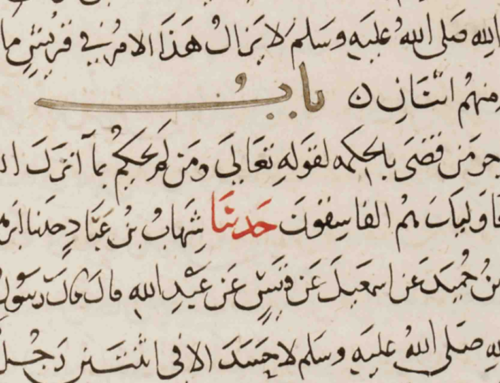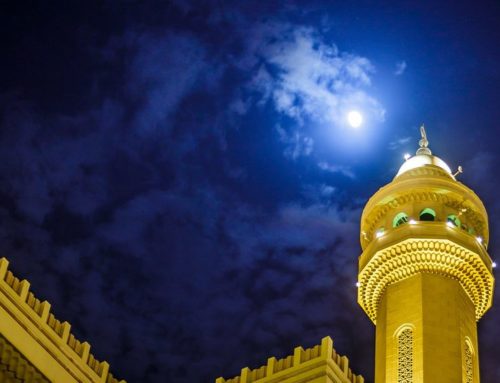Translated by Zameelur Rahman
The sixteenth issue [1]On the discussion of the hadith, “My ummah will divide into seventy three sects.” Abu Hurayrah narrated it, as transmitted by al-Tirmidhi in his Jami‘ (2640) – who said the hadith is “hasan … Continue reading is that the narration of those who narrated, “and that is the Jama‘ah (Group),” [2]See previous note for reference. as the meaning of the saved sect, is in need of commentary, because although its interpretation is clear by means of the elucidation of another narration – and that is his statement, “what I and my companions are upon,” [3]See first note for reference. – the meaning of the word, “Jama‘ah,” in terms of its intent in the unqualified usage of the Shar‘iah is in need of commentary; as it has appeared in many hadiths:
- from them is the hadith which we are commenting on;
- from them is what is authentic from Ibn ‘Abbas from the Prophet (Allah bless him and grant him peace), he said: “Whoever sees from his commander anything he dislikes, let him endure it, for indeed the one who departs from the Jama‘ah one hand span, then dies, he dies the death of Jahilyyah.” [4]Narrated by al-Bukhari and Muslim in their Sahihs
- And it is authentic from the hadith of Hudhayfah, he said: I said: “O Messenger of Allah! Verily we were in [a period of] Jahiliyyah and evil, and Allah brought this goodness to us. Then, is there any evil after this goodness?” He said: “Yes.” I said: “And is there any goodness after that evil?” He said: “Yes, and there is dinginess therein.” I said: “And what is its dinginess?” He said: “A people following other than [my] guidance, you recognise [some things] from them [as correct], and you do not recognise [other things].” And in another narration: “A people following other than my guidance and adopting other than my Sunnah, you recognise [some things] in them and do not recognise [other things].” I said: “Then, is there any evil after the goodness?” He said: “Yes, callers on the gates of Jahannam. Whoever answers them in that [call], they will throw them therein.” I said: “O Messenger of Allah! Describe them for us.” He said: “They will be of our complexion, and they will speak with our tongues.” I said: “What do you advise me, if that [time] reaches me?” He said: “[That] you stick to the Jama‘ah of the Muslims and their Imam.” I said: “And if they do not have a Jama‘ah, or an Imam?” He said: “Withdraw from the sects, all of them, even if it were that you bite on the root of a tree, until death reaches you, and you are in that [state].” [5]Narrated by al-Bukhari and Muslim in their Sahihs
Al-Tirmidhi and al-Tabari transmitted from Ibn ‘Umar, he said: ‘Umar ibn al-Khattab delivered a sermon to us at al-Jabiyah, and he said: “I stand amongst you in the standing-place of the Messenger of Allah (Allah bless him and grant him peace) amongst us, when he said: ‘I bequeath to you my companions, and then those who follow them and then those who follow them, and then lying will spread, until a man will take oath and will not be asked to take oath, and will bear testimony and will not be asked to bear testimony. [Incumbent] on you is the Jama‘ah! And beware of division! A man must not be in seclusion with a woman, for indeed a man is not secluded with a woman except the third of them is Satan. Satan is with the individual, and he is farther from two [people]. Whoever desires the centre of Jannah, let him adhere to the Jama‘ah. And whoever’s good pleases him and evil displease him, that is a believer.” [6]Al-Tirmidhi transmitted in his Jami‘ (2165) and he said: “This is a hasan sahih hadith.”
- And [it is reported] in al-Tirmidhi from Ibn ‘Abbas, he said: The Messenger of Allah (Allah bless him and grant him peace) said: “The hand of Allah is with the Jama‘ah.” [It is] an uncommon hadith. [7]Al-Tirmidhi transmitted in his Jami‘ (2166) and he said: “A hasan hadith, uncommon.”
- And [he narrated] the like of it from Ibn ‘Umar, he said: The Messenger of Allah (Allah bless him and grant him peace) said: “Verily Allah will not unite my ummah” – or he said “the ummah of Muhammad” – “on misguidance, and the hand of Allah is with the Jama‘ah, and whoever is isolated, is isolated in the Fire.” [8]Al-Tirmidhi transmitted it in his Jami‘ (2167), and he said: “This is an uncommon hadith through this route.”
- And Abu Dawud transmitted from Abu Dharr, he said: The Messenger of Allah (Allah bless him and grant him peace) said: “Whoever parts from the Jama‘ah one hand span, he has removed the noose of Islam from his neck.”
- And [it is narrated] from ‘Arfajah, he said: I heard the Messenger of Allah (Allah bless him and grant him peace) say: “Verily there will be tribulations after tribulations in my ummah, so whoever wishes to split the affair of the Muslims while they are united, strike him with the sword whoever he may be.” [9]Muslim transmitted it in his Sahih
The people differed over the meaning of the “Jama‘ah” intended by these hadiths, according to five views:
The first of them is that it is the greatest mass (al-sawad al-a‘zam) of the adherents to Islam, and this is what the statement of Abu Ghalib points to [10]See first note for reference., that the greatest mass are the ones that are saved from the sects, so whatever they are upon of the matter of their religion, that is the truth, and whoever opposes them, dies the death of Jahilyyah, whether he opposes them in something from the Shari‘ah, or with respect to their Imam and their Sultan – then, he is an opponent of the truth.
From those who professed this [view] is Abu Mas‘ud al-Ansari and [‘Abd Allah] ibn Mas‘ud.
Thus, it is narrated that when ‘Uthman was killed, Abu Mas‘ud al-Ansari was asked about the fitnah, so he said: “[Incumbent] on you is the Jama‘ah, for indeed Allah will not unite the ummah of Muhammad on misguidance, and endure until the righteous person finds rest or rest is found from a wicked person [by means of death],” and he said: “Beware of division for indeed division is misguidance.”
And Ibn Ma‘sud said: “[Incumbent] on you is hearing and obedience, and the Jama‘ah, for indeed it is the rope of Allah which He has commanded [you] with,” and then he made his hand into a fist, and he said: “Verily, those you dislike amongst the Jama‘ah are better than those you love within the division.”
And [it is narrated] from al-Hasan [ibn ‘Ali]: It was said to him: “Abu Bakr is the caliph of the Messenger of Allah (Allah bless him and grant him peace)?” He said: “Yes, by the One besides Whom there is no deity! It does not befit Allah to unite the ummah of Muhammad on misguidance.”
Based on this view, the mujtahids of the ummah, its ‘ulama’ and the adherents of the Shari‘ah who practise upon it, are included in the Jama‘ah, and those besides them are included in their ruling, because they are followers of them, and imitators of them, so all who come out of their group they are the ones who are isolated, and they are prey to Satan; and all of the people of innovation (bid‘ah) are included amongst these, because they oppose those who came earlier from the ummah, and are not included in their group at all.
Second, it is the group of the imams of the mujtahid ‘ulama’, so whoever comes out of what the group of the ‘ulama’ of the ummah are upon, he dies the death of Jahiliyyah, because Allah has appointed them as a proof over the worlds, and they are the ones that are meant by his (upon him peace) statement: “Verily, Allah will not unite my ummah on misguidance.” And [the explanation of] this is that the common people take their religion from them and take recourse to them in legal cases, and they are followers of them, so the meaning of his statement, “my ummah will not unite on error,” is: the ‘ulama’ of my ummah will not unite on error.
From those who professed this [view] are ‘Abd Allah ibn al-Mubarak, Ishaq ibn Rahway, and a group of the Salaf, and this is the view of the legal theorists.
It was said to ‘Abd Allah ibn al-Mubarak: “Who are the Jama‘ah that must be imitated?” He said: “Abu Bakr and ‘Umar,” and he continued to list [them] until he stopped at Muhammad ibn Thabit and al-Husayn ibn Waqid. Then it was said: “They are dead, so [who are they] from the living?” He said: “Abu Hamzah al-Sukkari.”
And [it was narrated] from al-Musayyib ibn Rafi‘, he said: “When some judicial decree came to them, not found in the Book of Allah, nor the Sunnah of the Messenger of Allah, they called it, ‘the selections of the rulers,’ and then the people of knowledge assembled for [consideration of] it, so whatever their judgement agreed on, it is truth.”
And the like of what Ibn al-Mubarak said was [narrated] from Ishaq ibn Rahwayh.
Based on this view, there is no involvement in this group of the one who is not a mujtahid ‘alim, because he is included in the people of imitation (taqlid). Hence, whoever from them practises that which opposes them, he is the person who dies a Jahili death.
And none of the innovators are included amongst them because, firstly, the ‘alim does not innovate, and only the one who claims knowledge for himself – although it is not so – innovates, and because the innovation expels him from the characteristic of those whose opinions are taken into consideration. This is based on the view that the innovator is not taken into consideration within consensus. If the view of their consideration is taken, then [this is only] in [issues] besides the issue in which they have innovated, because in the innovation itself, they have contravened consensus.
Hence, based on every possibility, they are not included in “the greatest mass” at all.
Third, that the Jama‘ah is the group of Sahabah specifically, since they erected the pillars of religion and anchored its poles, and they are the ones that will never assemble on error, though that is possible for other than them.
Do you not see his (upon him peace) statement: “The hour will not commence on any who say: ‘Allah, Allah,’” [11]Muslim transmitted it in his Sahih and his statement: “The hour will not commence but on evil people” [12]Muslim transmitted it in his Sahih? Since he (upon him peace) foretold that from the times [to come], there are times in which they will assemble on misguidance and disbelief.
They [i.e. the scholars] said: And of those who professed this opinion is ‘Umar ibn ‘Abd al-‘Aziz. Thus, Ibn Wahb narrated from Malik, he said: ‘Umar ibn ‘Abd al-‘Aziz would say: “The Messenger of Allah (Allah bless him and grant him peace) and the authorities of the affair after him instituted ways. Adopting them is confirmation of the Book of Allah, and completion of obedience to Allah, and strength on the religion of Allah. No one has [the right to] change them, nor to alter them, nor to look into what opposes them. Whoever takes guidance from them is guided and whoever seeks help from them is aided and whoever opposes them has followed other than the way of the believers, and Allah turned him to what he turned, and He will make him reach Jahannam, and an evil destination it is.” Malik said: “The determination of ‘Umar on this pleased me.”
Based on this view, the word “Jama‘ah” is in accordance with the other narration in his (upon him peace) statement, “what I and my companions are upon,” so it is as though it goes back to [the opinion] that whatever they said and whatever they instituted, and whatever they exercised their opinions on, is a proof with absoluteness, due to the testimony of the Messenger of Allah (Allah bless him and grant him peace) of this for them specifically, in his statement: “[Incumbent] on you is my Sunnah and the Sunnah of the guided caliphs,” [13]Transmitted by Ahmad, al-Tirmidhi, Ibn Majah and Abu Dawud amongst others. Al-Tirmidhi said: “[It is] a hasan sahih hadith.” and the likes of this, and because they are receivers of the prophetic speech, and the pavers of the Shari‘ah, who understood the intent of Allah by reception from His Prophet orally [i.e. directly], with knowledge and insight of the places of legislation and the indicators of circumstances; as opposed to other than them.
Therefore, all that they instituted is Sunnah, without speculation therein, in contrast to [those] besides them, because in that there is scope for speculation for the people of ijtihad, in terms of rejection or approval. Thus, the people of innovations are, therefore, not included in the Jama‘ah based on this view, absolutely.
The fourth is that the Jama‘ah is the group of the adherents of Islam, when they agree on a matter, then it is incumbent on other than them from the people of all religions to follow them, and they are those who Allah has guaranteed His Prophet (upon him peace) that He will not unite them on misguidance, and if disagreement occurred between them, it is necessary to recognise the truth is within what they disagreed on.
Al-Shafi‘i said: “There is no heedlessness in the Jama‘ah of the meaning of the Book of Allah, nor the Sunnah, nor analogy, and heedlessness is only in division.”
It appears that this view goes back to the second [view] and it also requires that which it requires; or it goes back to the first view, which is more apparent, and it has the property of the first, in that it is necessary for it to be the mujtahids from amongst them, and thereupon, their agreement, on this view, will never be innovation; thus, they are therefore the saved sect.
And the fifth is that which was preferred by al-Tabari, the Imam, in that the Jama‘ah is the group of Muslims when they unite on a commander, then he (upon him peace) commanded adherence to him, and he forbade parting from the ummah in that which they united upon in terms of their appointing him over them, because their parting [from them] will not go beyond one of two characteristics: either [it is] due to condemnation of them for obedience to their leader and attacking him in his conduct that was approved [by them] for no reason but for an interpretation of innovating an innovation in religion, like the Haruriyyah (Khawarij) who the ummah were ordered to fight, and the Prophet (Allah blessed him and grant him peace) called, “deviated from the religion”; or to seek leadership after the conclusion of the pledge to the commander of the Jama‘ah, since it is breaking an agreement and revoking a contract after its conclusion. And he (Allah bless him and grant him peace) said: “Whoever comes towards my ummah to split their group, strike his neck, whoever he may be.”
Al-Tabari said: Thus, this is the meaning of the command to stick to the Jama‘ah.
He said: As for the Jama‘ah which when it agrees on consenting to appoint a commander, the one who disassociates from them, his death is Jahilli, it is the group which Abu Mas‘ud al-Ansari and others described, and that is the bulk of people and the majority of them from the people of knowledge and religion and other than them, and that is the greatest mass [of believers].
He said: ‘Umar ibn al-Khattab (Allah be pleased with him) explained that. Thus, it is narrated from ‘Amr ibn Maymun al-Awdi, he said: ‘Umar said to Suhayb when he was stabbed: “Lead the people in prayer for three [days], and ‘Uthman, ‘Ali, Talhah, al-Zubayr, Sa‘d and ‘Abd al-Rahman should enter upon me, and Ibn ‘Umar should enter to the side of the house – and he has nothing of authority. Then, stand, O Suhayb, over their heads with the sword! If five [of them] pledge allegiance [to one of them] and one man turns [on his heel], strike his head with the sword, and if four pledge allegiance and two men turn [on their heels], strike their heads; until they give their assurance on [the caliphate of] one man.”
He said: Thus, the Jama‘ah which the Messenger of Allah (Allah bless him and grant him peace) commanded adherence to, and he called the one isolated from them “one who has parted from them,” is equivalent to the group which ‘Umar obligated caliphate for the one they agree on, and he commanded Suhayb to strike the head of the one isolated from them with the sword, because of the abundance of the number of those who agreed to pledge to him and the fewness of the number that is isolated from them.
He said: As for the report in which it is mentioned that the ummah will not assemble on misguidance, its meaning is that He will not unite them on causing deviation from the truth in that which afflicts them in the matter of their religion, such that the entirety of them would have deviated from [true] knowledge and missed it, and that will not occur in the ummah.
This is the entirety of his [i.e. al-Tabari’s] speech, and it has been transmitted with the meaning [of his statement], and [in] seeking out most of [its] wording.
Its upshot is that the Jama‘ah goes back to the agreement on an Imam that is in accordance with the Book and Sunnah, and that is manifest in [showing] that uniting on other than the Sunnah is outside of the meaning of the Jama‘ah mentioned in the hadiths, like the Khawarij and those who tread their path.
Thus, these are five opinions that revolve around the consideration of the people of Sunnah and adherence, and that they are those that are intended by the hadiths. Let us adopt that as a basis, and build on that another discussion which is:
The seventeenth issue, and that is that everyone agrees on the consideration of the people of knowledge and ijtihad, whether the common people are added to them or not. If the common people are not added to them, there is no difficulty that the consideration is only of the largest mass of the ‘ulama’ whose ijtihad is taken into consideration, so whoever strays from them and dies, his death is Jahili. And if the common people are added to them, then [that is] on the basis of following, because they do not know the Shari‘ah, so it is necessary for them to refer their religion to the ‘ulama’, since if they agreed on opposition to the ‘ulama’ in what they determined for them, they would be the majority and the greatest mass in the visible ummah, due to the fewness of the ‘ulama’ and the abundance of the ignorant ones; and no one can say that following the group of the common people is required, and the ‘ulama’ are parting from the group and are the ones that are condemned in the hadith. Rather, the reality is the reverse, and that the ‘ulama’ are the greatest mass, even if they are few, and the common people are the ones that departed from the Jama‘ah if they oppose [them]. If they agree, that is the obligation on them.
This is why when Ibn al-Mubarak was asked about the Jama‘ah which are imitated, he answered by saying: “Abu Bakr and ‘Umar” and he continued to list [them] until he stopped at Muhammad ibn Thabit and al-Husayn ibn Waqid. Then it was said: “They are dead, so [who are they] from the living?” He said: “Abu Hamzah al-Sukkari” – and he is Muhammad ibn Maymun al-Marwazi.
Thus, it is not possible that the common people are taken into consideration in these properties absolutely.
Based on this, were we to assume an age is free of a mujtahid, it is not possible for the common people to follow the likes of them, and their group would not be regarded as “the greatest mass” notified in the hadith, those that the one who opposes, his death is Jahili. Rather, transmitting from the mujtahids will take the place of the existence of the mujtahids. Hence, that which is binding on the common people in the presence of mujtahids is what is binding on the people of a supposed time that is free of mujtahids.
Also, following the analysis of one who has no analytical [ability], and the ijtihad of one who has no [ability to perform] ijtihad is pure deviance and is throwing in the dark, and this is the requirement of the authentic hadith: “Verily, Allah will not take knowledge by extracting [it], extracting it from the people, but will take knowledge by taking [the lives of] the ‘ulama’, until He does not leave an ‘alim; the people will adopt for [their] leaders the ignorant ones, so they will be asked, and issue fatwa without knowledge, so will be misguided and misguide [others].”
Abu Nu‘aym narrated from Muhammad ibn al-Qasim al-Tusi, the servant of Muhammad ibn Aslam al-Tusi, he said: I heard Ihsaq ibn Rahwayh – and he mentioned in a hadith he traced to the Prophet (Allah bless him and grant him peace), he said: “Verily, Allah is not to gather the ummah of Muhammad on misguidance. So when you see dissention, [incumbent] on you is the greatest mass.” A man said: “O Abu Ya‘qub! Who is the greatest mass?” He said: “Muhammad ibn Aslam and his companions and those who follow him.”
Then he said: A man asked Ibn al-Mubarak: “Who is the greatest mass?” He said: “Abu Hamzah al-Sukkari.” Then Ishaq said: In that time, meaning, Abu Hamzah, and in our time, Muhammad ibn Aslam and those who follow him.”
Then Ishaq said: “Were you to ask the ignorant people about the greatest mass, they will say, the majority of people. They do not know that the Jama‘ah is an ‘alim holding fast to the footsteps of the Prophet (Allah bless him and grant him peace) and his way, so whoever is with him and follows him, that is the Jama‘ah.” And then Ishaq said: “I have not heard a scholar for fifty years that was stronger in adherence to the footsteps of the Prophet (Allah bess him and grant him peace) than Muhammad ibn Aslam.”
So examine this narration which clarifies the error of those that assume that the Jama‘ah is the majority of people, even if there is no scholar amongst them, and this is the understanding of the common people, not the understanding of the ‘ulama’. Let the one that is given accordance keep his feet firm in this slippery place, so that he does not deviate from the straight path. And there is no guidance but from Allah.
Al I‘tisam, 3:294-315
| ↑1 | On the discussion of the hadith, “My ummah will divide into seventy three sects.”
Abu Hurayrah narrated it, as transmitted by al-Tirmidhi in his Jami‘ (2640) – who said the hadith is “hasan sahih” –, and Ibn Majah in his Sunan (3991) and Abu Dawud in his Sunan (4586). It is also transmitted authentically from the Sahabah, Anas ibn Malik, Mu‘awiyah ibn Abi Sufyan and ‘Awf ibn Malik al-Ashja‘i, with the addition, “All of them are in the Fire, except one, and that is the Jama‘ah.” (Musnad Ahmad, 12208, 12479, 16937; Sunan Abi Dawud, 4587; Sunan Ibn Majah, 3992) Al-Tirmidhi (2641) reported it from ‘Abd Allah ibn ‘Amr with the addition: “All of them are in the Fire except one.” It was said: “Who are they, O Messenger of Allah?” He replied: “What I and my companions are upon.” Al-Tirmidhi comments that it is “hasan, uncommon (gharib).” Abu Bakr ibn Abi Shaybah in his Musannaf (39047) and al-Tabrani in al-Mu‘jam al-Kabir (8035) transmitted through two different authentic routes from Abu Ghalib that the companion, Abu Umamah al-Bahili, narrated this hadith from the Prophet (peace and blessings be upon him) with the addition: “All of them are in the Fire except the greatest mass (al-sawad al-a‘zam).” Abu Ghalib is a student of Abu Umamah, described by Ibn Hajar al-‘Asqalani as: “truthful, erring.” (Tahrir al-Taqrib, 4:249 |
|---|---|
| ↑2 | See previous note for reference. |
| ↑3 | See first note for reference. |
| ↑4 | Narrated by al-Bukhari and Muslim in their Sahihs |
| ↑5 | Narrated by al-Bukhari and Muslim in their Sahihs |
| ↑6 | Al-Tirmidhi transmitted in his Jami‘ (2165) and he said: “This is a hasan sahih hadith.” |
| ↑7 | Al-Tirmidhi transmitted in his Jami‘ (2166) and he said: “A hasan hadith, uncommon.” |
| ↑8 | Al-Tirmidhi transmitted it in his Jami‘ (2167), and he said: “This is an uncommon hadith through this route.” |
| ↑9 | Muslim transmitted it in his Sahih |
| ↑10 | See first note for reference. |
| ↑11 | Muslim transmitted it in his Sahih |
| ↑12 | Muslim transmitted it in his Sahih |
| ↑13 | Transmitted by Ahmad, al-Tirmidhi, Ibn Majah and Abu Dawud amongst others. Al-Tirmidhi said: “[It is] a hasan sahih hadith.” |






